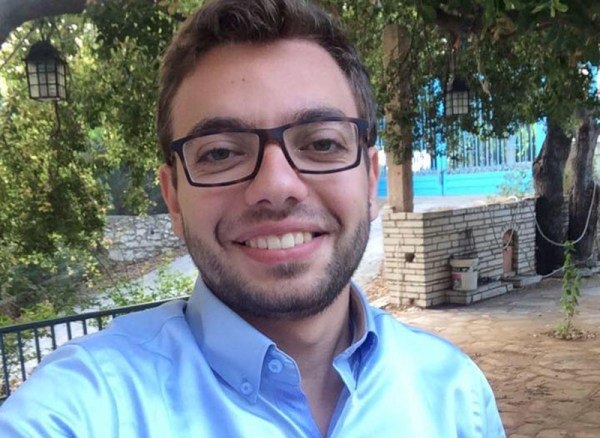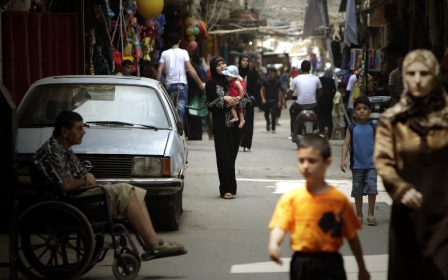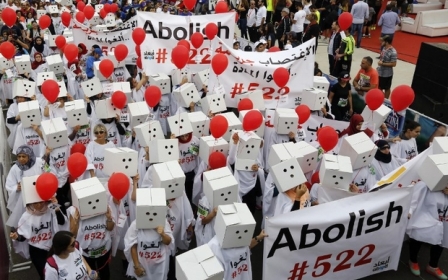Dear Lebanese politicians: If you want to honour Roy Hamouch, start showing respect for the law

In recent weeks, Lebanese President Michel Aoun, Parliamentary Speaker Nabih Berry, Prime Minister Saad Hariri, you have all called for the toughest punishment to be handed down to the killers of Roy Hamouch.
These senseless killings have not been committed because the death penalty has not been enforced in Lebanon
Hamouch, an engineering student who was days away from graduating, was brutally gunned down on the Dora Highway in Beirut on 7 June after his car reportedly bumped into another car whose passengers believed they were above the law. After the incident, Interior Minister Nohad Maachnouk even called for restoring the use of the death penalty.
The death of Roy is tragic, but it is not surprising. Under your leadership and the power sharing between your parties, Lebanon has turned into a jungle.
One month before Hamouch was killed, Sara Sleiman, a teacher who was also 24, was killed on a street outside a nightclub in Zahle. An accident outside the club had blocked the road and a man reportedly started shooting at people as he attempted to drive through and got into an argument with someone at the scene. Sleiman was killed and another person was injured.
In July 2015, 45-year-old George Rif, a father of four, was stabbed to death in Gemmayzeh by a man who thought Rif had cut him off while driving. His wife watched as he was repeatedly stabbed.
His killing came after a series of other gruesome murders, many linked to cases of road rage, including those of Yves Naufal, Adib Mohammad Hizan, Marcelino Zamata and many others. In some of these cases, like George Rif’s, whose killer was reportedly a bodyguard for "an influential figure", the killers were also connected to influential people.
Thugs with egos
These senseless killings have not been committed because the death penalty has not been enforced in Lebanon. They were committed by thugs with an inflated sense of ego because they had wasta (Arabic slang for influence), a common infliction in a country where nepotism is king.
This feeling of impunity and entitlement that everyone with wasta has is a direct result of the Lebanese system’s lack of accountability, from security institutions to the highest echelons of the state
Wasta takes you a long way in Lebanon. It provides you a right to carry a weapon, drive cars with tinted windows and scare drivers you bypass at crossroads, with car speakers blasting. Wasta presents you with a get-out-of-jail-free card and shortened sentences, whether you have been arrested for medical malpractice, killing someone in an act of road rage or beating a spouse for years.
This is not something we just see on local television. It is something we experience in our daily life. A few years ago, an acquaintance of mine argued with the passengers of another car over who had to right of way. They shot at each other. No one was arrested and both got off with a slap on their wrist. My acquaintance had, after all, the backing of a government minister.
This feeling of impunity and entitlement that everyone with wasta has is a direct result of the Lebanese system’s lack of accountability, from security institutions to the highest echelons of the state.
Two weeks ago, as I was leaving the American University of Beirut Medical Center (AUBMC), one of Beirut’s most prominent hospitals, I noticed two general security cars were blocking the road leading to the emergency room. When I asked the hospital’s security guards why they allowed it, I was told, “We can’t do anything about it because we would be beaten up.” When I asked the uniformed officer to move the car, they brushed me off, laughing at my request.
Similarly a year ago, when my family took a relative of mine to the AUBMC because he was having symptoms of a heart attack, the car of a former health minister - yes himself a doctor - was blocking the road to the emergency room. The convoy was only moved after I took a picture of it and threatened to put it on social media.
Impunity galore
These people who act like they own the country and have no respect for normal citizens do so because you, dear politicians, allow them to.
If they are not state employees like those who blocked the emergency room, they are family members and friends of people in government or in security services. Your people.
These killings won’t stop if you start using the death penalty. They will stop the day you start to lead by example
They are under your authority and immune to the state of law because you allow it, because members of the Lebanese state from security officials to ministers to heads of states and parliamentarians protect those close to them, even when others are killed as a result. And because ultimately they follow the example of politicians in power.
Lebanon has gone from sitting at the 18th position in the failed state ranking in 2008 to the 40th position in 2016, thanks to the ill-management of your parties that have been sharing power since 2008.
These killings won’t stop if you start using the death penalty. They will stop the day you start to lead by example. When your convoys don’t push everyone off the road to pass and your bodyguards do not wave their guns at random passers-bys on the country’s highways. When you start respecting the citizens who have elected you, maybe then, these crimes will stop.
This is when the death of Roy Hamouch will stop being senseless. By setting an example, and only then, will you show and prove real respect for his death.
- Mona Alami is a researcher and journalist covering Levant politics. She is a non-resident-fellow at the Atlantic Council. Her primary focus is radical organisations. She holds a BA and an MBA in management.
The views expressed in this article belong to the author and do not necessarily reflect the editorial policy of Middle East Eye.
Photo: A recent photo of Roy Hamouch, 24, who was killed on 7 June 2017 (Twitter/@libanews)
New MEE newsletter: Jerusalem Dispatch
Sign up to get the latest insights and analysis on Israel-Palestine, alongside Turkey Unpacked and other MEE newsletters
Middle East Eye delivers independent and unrivalled coverage and analysis of the Middle East, North Africa and beyond. To learn more about republishing this content and the associated fees, please fill out this form. More about MEE can be found here.





